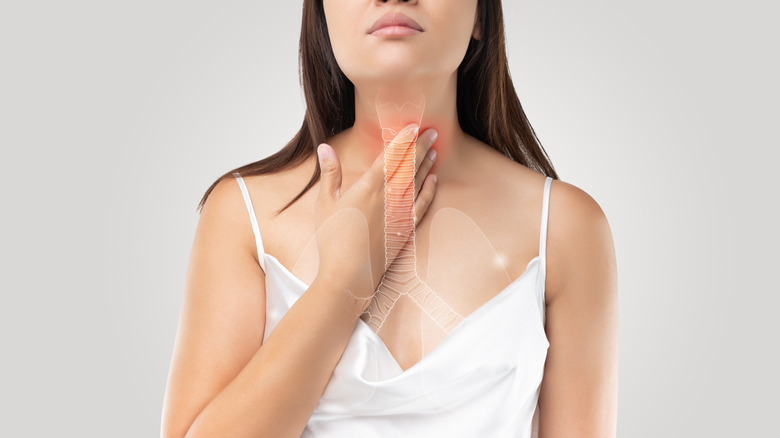What Happens To Your Throat When You Swallow Really Hot Food
We've all probably done it at some point in our lives. We reach for a slice of pizza or grab a fork full of creamy hot mashed potatoes and put it in our mouths without thinking. And no, we're not referring to eating too much spicy food. This is about piping hot food and beverages. Before you know it, your entire mouth is stinging. Your tongue feels burned and you want to spit it out, but you swallow all of it in one swift gulp instead. And now it's burned your throat — more specifically, your larynx. Yes, this can happen: Laryngeal burns from hot food consumption are possible, albeit rare, according to a 2020 study published in the International Journal of Surgery Case Reports. Most of the time, we either spit out or try to manage the scalding hot piece of bread in our mouths before we send it down our throats.
But in the rare case that you do swallow a really hot piece of chicken, the key is to assess the damage first, shared Bangalore-based consultant dental surgeon Dr. Aniruddha KB via the Doctors' Circle World's Largest Health Platform channel on YouTube. If the burn is on your tongue, you can try soothing it with cold water. If you feel as though the burn has reached your throat, the dental surgeon advises to "assess if the lesion has extensively damaged the mouth." Burns of this nature are often insignificant and resolve on their own.
When to be worried
Most of the time, you can soothe a burned throat by sipping on some cool water and letting it gently enter your throat, sucking on some ice cubes, and gargling a solution of warm water and salt, per Tuggeranong Square Medical Practice. If you feel discomfort several hours after swallowing the hot food, this is when you should be concerned about your sore throat. See a doctor. An ear, nose, and throat specialist will examine the damage before recommending what needs to be done.
There was also the case of the British national, Darren Hickey, who died due to complications that arose from having ingested a really hot fishcake while at a wedding (via Yahoo Life). Hickey's lower airway had been damaged due to the incident, which eventually led to asphyxiation.
Thermal injuries result in your body releasing more blood to the site of the injury, explained emergency physician at Royal Columbian and Eagle Ridge hospitals in British Columbia, Dr. Adam Lund, per Yahoo Life. This can result in inflammation that can disrupt your airflow. "That decreases the diameter available a room [sic] for saliva or moving air up and down," explained Dr. Lund. "On a minor level, that can cause hoarseness in the voice or a sense of tightness and discomfort. On a severe level, it can severely cut off ability to move air."
Consistent consumption of really hot food could cause cancer
While you don't have to worry about the occasional burn in your throat that resolves on its own, persistently consuming really hot beverages or food has been linked to esophageal cancer, according to a 2019 study published in the International Journal of Cancer.
Oncologist Dr. Davendra Sohal told Cleveland Clinic that years of this habit could put someone at risk for esophageal cancer brought on by chronic inflammation in the throat or esophagus. "Any type of hot food or liquid has the potential to irritate the lining of the throat and esophagus," explained Dr. Sohal, describing temperature as "the biggest risk factor."
So what is the right temperature for eating food or drinking beverages? The study recommends sticking to a temperature below 140 degrees Fahrenheit. Yes, there's something to be said about a steaming hot cup of coffee on a cold morning and a slice of pizza that still has the heat emanating from it. But you're better off letting both of those cool down a little before you swallow them, for the long-term health of your mouth and throat.



